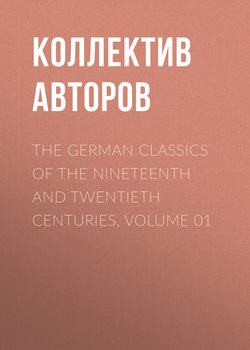The German Classics of the Nineteenth and Twentieth Centuries, Volume 01

Реклама. ООО «ЛитРес», ИНН: 7719571260.
Оглавление
Коллектив авторов. The German Classics of the Nineteenth and Twentieth Centuries, Volume 01
EDITOR'S PREFACE
PUBLISHERS' FOREWORD
THE LIFE OF GOETHE
POEMS
GREETING AND DEPARTURE4 (1771)
THE HEATHROSE5 (1771)
MAHOMET'S SONG6 (1773)
PROMETHEUS7 (1774)
THE WANDERER'S NIGHT-SONG8 (1776)
THE SEA-VOYAGE9 (1776)
TO THE MOON10 (1778)
THE FISHERMAN11 (1778)
THE WANDERER'S NIGHT-SONG12 (1780)
THE ERL-KING13 (1782)
THE GODLIKE14 (1783)
MIGNON15 (1785)
PROXIMITY OF THE BELOVED ONE16 (1795)
THE SHEPHERD'S LAMENT17 (1802)
NATURE AND ART18 (1802)
COMFORT IN TEARS19 (1803)
EPILOGUE TO SCHILLER'S "SONG OF THE BELL"20
ERGO BIBAMUS!22 (1810)
THE WALKING BELL23 (1813)
FOUND24 (1813)
HATEM25 (1815)
REUNION26 (1815)
PROOEMION27 (1816)
THE ONE AND THE ALL28 (1821)
LINES ON SEEING SCHILLER'S SKULL29 (1826)
A LEGACY30 (1829)
INTRODUCTION TO HERMANN AND DOROTHEA
HERMANN AND DOROTHEA (1797)31
CALLIOPE
TERPSICHORE
THALIA
EUTERPE
POLYHYMNIA
CLIO
ERATO
MELPOMENE
URANIA
INTRODUCTION TO IPHIGENIA IN TAURIS
IPHIGENIA IN TAURIS (1787)32 A DRAMA IN FIVE ACTS
ACT I
SCENE I
SCENE II
SCENE III
ACT II
SCENE I
SCENE II
ACT III
SCENE I
SCENE II
SCENE III
ACT IV
SCENE I
SCENE II
SCENE III
SCENE IV
SCENE V
ACT V
SCENE I
SCENE II
SCENE III
SCENE IV
SCENE V
SCENE VI
THE FAUST LEGEND FROM MARLOWE TO GOETHE
INTRODUCTION TO FAUST
THE TRAGEDY OF FAUST DRAMATIS PERSONÆ
OBERON. TITANIA. ARIEL. PUCK, ETC., ETC
PROLOGUE FOR THE THEATRE
PROLOGUE IN HEAVEN
FAUST—PART I (1808)33
NIGHT
STUDY
AUERBACH'S CELLAR IN LEIPZIG
EVENING. A SMALL AND NEAT ROOM
PROMENADE
THE NEIGHBOR'S HOUSE
A STREET
GARDEN
A SUMMER-HOUSE
MARGARET'S ROOM
MARTHA'S GARDEN
AT THE WELL
NIGHT. STREET BEFORE MARGARET'S DOOR
CATHEDRAL
WALPURGIS-NIGHT
WALPURGIS-NIGHT'S DREAM; OR, OBERON AND TITANIA'S GOLDEN WEDDING-FEAST
A GLOOMY DAY. A PLAIN
NIGHT. OPEN COUNTRY
DUNGEON
FAUST—SELECTIONS FROM PART II (1832)
ACT THE FIRST
ACT THE SECOND
ACT THE THIRD
ACT THE FIFTH
Отрывок из книги
The German Classics is the first work issued by The German Publication Society in pursuance of a comprehensive plan to open to the English-speaking people of the world the treasures of German thought and achievement in Literature, Art and Science.
In the production of this monumental work the thanks and appreciation of the Publishers are especially due to Hugo Reisinger, Esq., whose loyal support and constant encouragement have made possible its publication.
.....
Out of the "reverence for nature" (Naturfrömmigkeit) with which he contemplated all created things—from "the Cedar of Lebanon to the hyssop which grows on the wall," from the mighty movement of the stream in Mahomet to the bit of cheese that is weighed by the old woman in Die Geschwister—out of all comes a widening of the poetic horizon, the like of which had never before been seen in any age. The Romanticists in reality only made a watchword out of this practice of Goethe's when they demanded "progressive universal poetry," by which they meant that the poet should live through the whole experience of creation in his own person. In demanding this, they—as the aging Goethe had himself done—formed too narrow a conception of the personal, and rejected too absolutely the problems of politics and of science, so that once more a narrowing process ensued. But even in their own ranks this tendency was offset by the exigency of the times; after the wars of liberation, political and in general, poetry written with a purpose was actually in the ascendency. The poetry of the mood, like that of a Mörike, remained for a long time almost unknown on account of its strictly intimate character. In the success of Ernst von Wildenbruch we see provisionally the last victory of this sort of literature—which directly proclaims what is worth striving for—at least in its loftier form. For the contemporary novel constantly takes for its subject the emancipation of woman, or the fight for culture, the protection of the Ostmark, or the fight against alcohol.
On the other hand the Romantic school has also broadened the realm of poetic material in a very important manner, by adding to it the provinces of the phantastic, the visionary, the fairy-like, and by giving to the symbolical an undreamed-of expansion.
.....